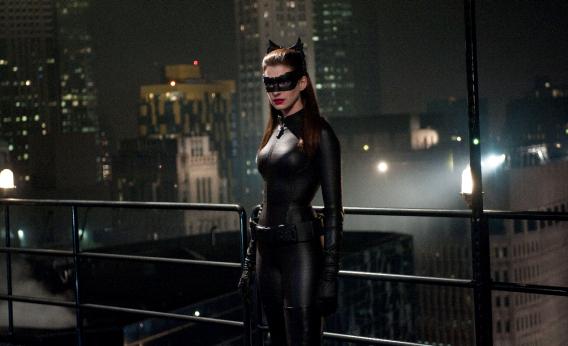Culture
Found Footage: “The Dark Knight Rises”

Do you ever look at the Rotten Tomatoes score for something and get confused? How is it that almost no one disliked The Artist? Couldn’t they find more people to rag on The King’s Speech, a self-congratulatory piece of swaddle that had a good trashing coming? And, seriously, how did so many people consent to sitting through all of The Curious Case of Benjamin Button? Were they paid by the studio, or on morphine, or both? All of these are fine examples of Found Footage column nominees and probable future topics (especially the fucking King’s Speech, a movie I wanted to drown like a rat), but there’s no weirder example of critical groupthink than the recent The Dark Knight Rises, a movie about which I’m honestly surprised Warner found anyone to say anything nice. However, the thing that explains it is, when you cross-reference it with the Metacritic scores on the film, you can see that many critics merely “liked” it or “admired” it rather than really loving it.
Now, The Dark Knight Rises wasn’t a total The Matrix Revolutions/Alien 3 disaster, or quite as terrible as Prometheus was (which was also weirdly well-reviewed), because it has exactly one element worth sticking around for: Anne Hathaway. As Selina Kyle, Hathaway is everything a comic book movie should be. There’s a sulking seriousness to her role that gives it a dramatic heft and raw edge (so much so that she often threatens to go overboard with those low-angle menacing looks), the kind of part she made her mark as a thespian with in Rachel Getting Married. However, Hathaway’s entire performance as the never-actually-identified-as Catwoman is conducted with a knowing smirk and playfulness that’s infectious. Pardon the pun, but you can tell that Hathaway (whose talent is often overlooked) relished the chance to dig her claws into a role that shows off her dramatic, comedic and posterior assets, and laps up every minute of it. She isn’t always given much to do, but nearly every one of her lines is a home run, and her exchange with Mopey McBatman at the charity gala is the centerpiece of the film. Hathaway’s delivery there is so effortless, I’d wager it was done in one take.
But outside of that, there’s not a lot to recommend, and the film runs as a Greatest Hits of Christopher Nolan’s worst instincts as a filmmaker. The first two-thirds of the film are heavy on a convoluted, haphazardly cobbled-together story that doesn’t make a lot of sense. They spend too much time introducing characters that never end up fully developed or, like Ben Mendelsohn’s Machiavellian Daggett, just get disposed of or lost somewhere in the second act. If nothing else, Nolan’s Inception did a terrific job of juggling its characters and moving set pieces, but in The Dark Knight Rises, we sense a lot of movement but don’t feel like we are going anywhere. Nolan assumes that we will hang on long enough to become interested later, but to the extent that I eventually figured out where all this was headed, I frankly didn’t give a damn anymore. You have to earn interest in order to sustain it.
The biggest problem here is that neither the hero nor the villain say or do much that’s particularly interesting. Christian Bale’s Batman is a whiny mope who broods for most of the first act like he’s in a Sofia Coppola movie and spends the entire second act in a hole. While I watched him be tortured for a solid hour, I wondered why the movie was even about him. Couldn’t they have just called it Catwoman and let him die? However, I think that this sequence (of Batman being endlessly tormented like he’s in a Saw movie) is reflective of the ponderous seriousness with which Nolan conducts his work. Like David Fincher and Stanley Kubrick before him, Nolan revels in human pain and misery and seeing people pushed to extremes, and they are clear influences on Nolan’s art. However, Fincher and Kubrick’s best work balances that with humanity, soul and wit; The Social Network and Full Metal Jacket (two of their respective greatest films) are savagely, often inappropriately funny, but I don’t think Nolan’s Batman even knows a knock-knock joke. He’s like the superhero version of Leonard Cohen, and the man can’t even get laid without feeling sad about it later. When did our superheroes have to become so emo? Did Batman and Robin kill fun?
Even though I felt this year’s The Avengers had its faults (and it had many), Joss Whedon’s script remembered to have fun with its characters. The best parts of the film weren’t the numerous explosions or extended takes of Scarlett Johansson’s figure; the film came alive when it was about a bunch of people who weren’t too busy saving the world to goof off and make mischief, like a high-budget version of The Little Rascals. Even 2004’s Spider-Man 2 (a.k.a. the benchmark for emo in comic book movies) balanced its ubiquitous angst with action scenes that were kinetic and joyous, as well as the sauciness Sam Raimi parades through his Evil Dead films. As a filmmaker, Nolan hasn’t yet learned tonal balance, which makes his work come off like a very self-serious tone poem, something from the bottom of T.S. Eliot’s drawer. If he can ever move past being serious to being fun, Nolan might make a movie that can be enjoyed, more than just appreciated.